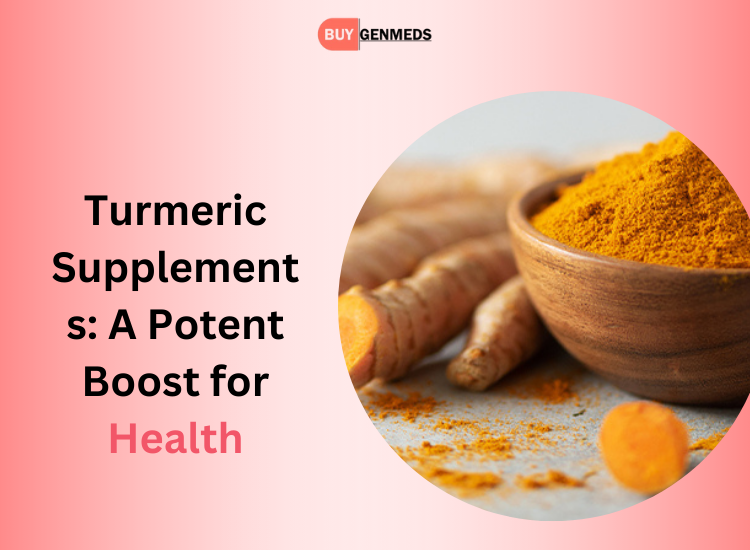Turmeric, often hailed as the “golden spice,” has been used for centuries in traditional medicine, particularly in Ayurveda and Chinese medicine, due to its impressive range of health benefits. Modern science has begun to catch up with these ancient practices, confirming that turmeric offers powerful anti-inflammatory, antioxidant, and healing properties. The primary active compound in turmeric, curcumin, is largely responsible for these health Benefits, and has been studied extensively for its therapeutic potential. While turmeric can be consumed as part of a regular diet, the increasing availability of turmeric supplements makes it easier to get concentrated doses of curcumin, especially for those seeking specific health improvements. Before diving into the health benefits, it’s essential to understand what makes turmeric such a powerful supplement. The key active ingredient, curcumin, is a polyphenol that has been extensively studied for its anti-inflammatory and antioxidant properties. Inflammation is a natural immune response to injury or infection, but chronic inflammation is linked to numerous diseases, including heart disease, diabetes, arthritis, and cancer. Curcumin works by inhibiting molecules like NF-κB and COX-2, which play critical roles in inflammatory processes. By targeting these pathways, curcumin can help reduce chronic inflammation in the body. However, curcumin only makes up about 3% of turmeric by weight, and its bioavailability (how well the body absorbs and uses it) is low. This is why many people turn to turmeric supplements, which are specially formulated to improve the absorption of curcumin, often through the addition of piperine. One of the most well-documented benefits of turmeric supplements is their ability to reduce chronic inflammation. Inflammation is at the root of many modern diseases, including heart disease, arthritis, metabolic syndrome, and Alzheimer’s disease. Curcumin’s anti-inflammatory effects can be powerful in mitigating these conditions. Rheumatoid arthritis and osteoarthritis are both characterized by inflammation of the joints, leading to pain and stiffness. Multiple studies have shown that curcumin can help reduce symptoms of arthritis, with some research indicating that it works as effectively as nonsteroidal anti-inflammatory drugs (NSAIDs) but without the side effects. Regular use of turmeric supplements can alleviate joint pain and improve mobility for people suffering from these conditions. Curcumin has been shown to improve the function of the endothelium, which is the lining of blood vessels. Endothelial dysfunction is a major contributor to heart disease and involves the inability of the endothelium to regulate blood pressure and clotting. By improving endothelial function and reducing inflammation, curcumin can help lower the risk of developing heart disease. Additionally, it helps reduce oxidative stress, another factor that can lead to heart problems. The antioxidant properties of curcumin are another critical factor behind the health benefits of turmeric supplements. Free radicals are unstable molecules that can cause oxidative stress, leading to cellular damage, inflammation, and aging. By neutralizing these harmful molecules, turmeric plays a crucial role in protecting the body from chronic diseases, including cancer, neurodegenerative diseases, and cardiovascular issues. Research suggests that curcumin may have anticancer properties. Studies have shown that curcumin can inhibit the growth of cancer cells and even induce apoptosis (programmed cell death) in certain types of cancer, including breast, colon, prostate, and lung cancer. Curcumin’s anti-inflammatory and antioxidant effects play a role in slowing the progression of cancerous cells. While turmeric supplements are not a replacement for traditional cancer treatments, they may support overall health and act as a complementary approach to cancer prevention. Neurodegenerative conditions, such as Alzheimer’s and Parkinson’s disease, are linked to oxidative stress and inflammation. Curcumin’s ability to cross the blood-brain barrier makes it a potential treatment for these diseases. It has been shown to reduce inflammation and amyloid plaque buildup in the brain, both of which are key contributors to Alzheimer’s disease. Regular consumption of turmeric supplements may help reduce the risk of these neurodegenerative diseases or slow their progression. Emerging research suggests that turmeric supplements can benefit mental health, particularly in reducing symptoms of depression and anxiety. Chronic inflammation and oxidative stress are thought to play a role in the development of mood disorders, and turmeric’s ability to reduce both may have a positive impact on mental well-being. Several clinical trials have shown that curcumin may help reduce symptoms of depression. One study found that curcumin was as effective as Prozac (fluoxetine) in managing depression without the side effects associated with antidepressant medications. Curcumin appears to increase levels of brain-derived neurotrophic factor (BDNF), a protein that supports the growth of new neurons and enhances brain function. Low levels of BDNF are linked to depression, and boosting its levels may help alleviate depressive symptoms. Turmeric has long been used in skincare for its ability to reduce inflammation, improve skin tone, and promote wound healing. These benefits extend to turmeric supplements as well, as they can improve skin health from within by reducing inflammation and protecting against oxidative stress. Curcumin can modulate the immune system, making it more efficient in fighting infections and reducing excessive immune responses, which can cause autoimmune diseases. Turmeric supplements are often taken to boost immunity, particularly during cold and flu season. If you’re considering adding turmeric supplements to your health regimen, there are a few things to keep in mind: Look for turmeric supplements that contain a high concentration of curcumin (at least 95% curcuminoids) and include piperine to enhance absorption. Some supplements also come in liposomal or micelle forms, which further improve bioavailability. The Science Behind Turmeric: Understanding Curcumin
Curcumin’s Role in Inflammation:
Turmeric Supplements for Reducing Chronic Inflammation
Arthritis Relief:
Heart Disease Prevention:
Antioxidant Benefits and Disease Prevention
Cancer Prevention:
Neurodegenerative Diseases:
Supporting Mental Health: The Role of Turmeric in Depression and Anxiety
Curcumin as a Natural Antidepressant:
Skin Health and Anti-Aging Benefits
Enhancing Immune Function
Practical Tips for Incorporating Turmeric Supplements Into Your Routine
Choosing the Right Supplement:
Turmeric Supplements: A Potent Boost for Health

10
Oct

